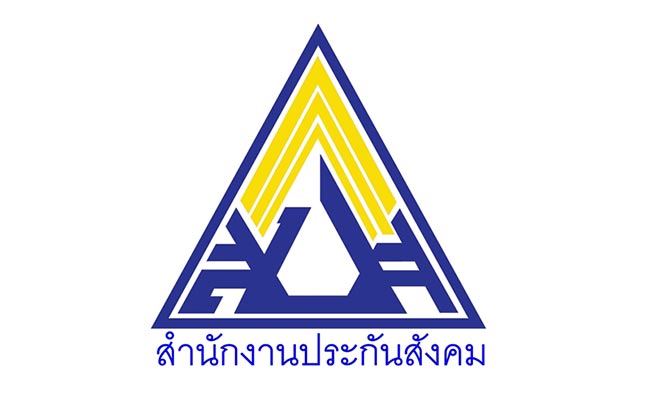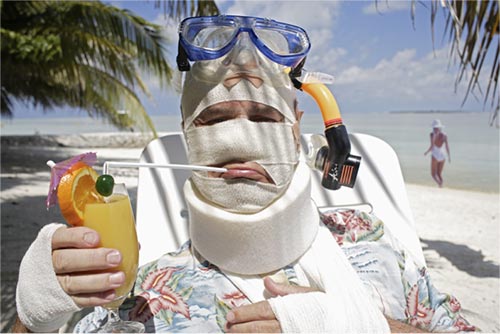You might be surprised to learn that working in Thailand grants you access to the social security system.
Once you have your work permit and start working, your employer will register you for medical and employment benefits in return.
In this article I'll cover everything you need to know, including the different types of social security, how much you'll pay in contributions, and the level of coverage you'll get.
Contents

Social Security Eligibility
Social Security in Thailand is governed under the act of the same name. Those who contribute and are therefore eligible for benefits are listed under three sections of the Social Security act:
- Section 33: for those younger than 60 years old (but older than 15) and working in Thailand*.
- Section 39: an employee who has paid contributions for not less than 12 months and ceases to be employed but still wants to contribute and receive benefits. This would include those who leave a company to go freelance. This person must inform the SSO within six months and submit a contribution to the fund by the 15th day of the following month.
- Section 40: any other person who is not an employee under section 33 or section 39 may apply to be an insured person.
* Working in Thailand means to work legally, with a permit, for a company.
Benefits Overview
Section 33 is the bracket under which most people fall. The benefits include:
- medical coverage
- maternity coverage
- child coverage
- disability benefits
- death compensation
- pension
- unemployment benefit
Section 39 is similar but you lose the unemployment benefit.
Application Process
Social security is a legal requirement for those working in a company with one or more employees. You can't opt out of contributions, regardless of whether you have a private medical insurance policy.
If you own a business, you will still need to contribute and ensure your employees are enrolled too.
If you're working for a company there is no action required on your behalf.
As soon as you start the job your company will contact the social security office and apply for you. This must be done within 30 days of your job start date.
Once complete, your HR manager may ask for your preferred hospital for medical treatment, though some companies will choose a hospital for you based on company preference.
The latter is the reason some expats have no idea that they are entitled to social security benefits until much later down the line. In fact, many continue to pay for healthcare they could have otherwise gotten free of charge.
Recommended social security hospitals in Bangkok are Police Hospital, Chulalongkorn Hospital, and Rajavithi Hospital.
If you leave to work for a new company, your new employer will re-register you.
Contributions
In Thailand you are required to contribute 5% of your salary to the social security system, up to a maximum salary of 15,000 Baht per month. The minimum salary to be eligible is 1,650 Baht per month.
As a foreign national, your salary will no doubt exceed the maximum, but the threshold means you won't pay more than 750 Baht per month. Your employer then matches this amount and makes a payment to the SS office.
Your contribution is automatically deducted from your salary by your company's accounts team on a monthly basis.
Coverage Breakdown
Medical Coverage
Should you fall ill, you can use your coverage to get free treatment at the hospital registered with the company you work for. This covers anything “medically necessary” and pre-existing conditions.
You will be entitled to non-occupational injury or sickness benefit if you have contributed to social security for not less than 3 months out of the 15 months preceding the required care.
Your cover provides the following expenses:
- Medical examination and diagnosis.
- Health promotion and disease prevention.
- Medical treatment and rehabilitation.
- Expenses for admission and treatment in hospital/clinic.
- Medicine and medical supplies.
- Cost of ambulance services or transportation.
- Other necessary expenses.
If you are absent from work you will receive 50% of your salary, capped at the SSO’s maximum salary of 15k THB/month. This period must not exceed 90 days, and your time off work must not exceed 180 days in a year.
In the case of sickness from a chronic disease, you are entitled to benefits for more than 180 days in a given year, but this must not exceed 365 days.
Your cover entitles you to a free health check-up each year. This includes basic checks on the following:
- Weight
- Blood pressure
- Blood-sugar
- Cholesterol
This is an adequate and useful check-up, but if you want a premium version with all the frills, you'll have to pay privately. Private hospitals have packages ranging from 5,000-25,000 Baht.
Dental Coverage
Under the social security system, you can claim 900 Baht per year for teeth cleaning, fillings and tooth extraction.
If your dentist is enrolled with the social security office, they can claim the money directly from the office rather than you having to make a claim.
If you go privately (at a non SS dental practice), you will need to ask for a dental certificate and a claim form, and keep the receipt.
You will then need to fill out the form and, along with a copy of your bank passbook, send it to your local social security office so that your reimbursement can be processed.
If you have a helpful HR department, they may agree to handle this process on your behalf.
Maternity Coverage
You are entitled to maternity benefits provided that you have paid contributions for not less than 5 months within the last 15 months.
Maternity expenses covered by social security include:
- Medical examination and prenatal care (200 to 500 Baht per prenatal-care visit, up to a maximum of 1,500 Baht).
- Medical treatment.
- Medicine and medical supplies.
- Child delivery (up to 15,000 Baht).
- Expenses for admission and treatment in hospitals/clinics.
- Nursery care and treatment.
- Cost of ambulance services or transportation.
- Other necessary expenses.
If you need to leave work to give birth, you will receive 50% of your salary for a period of 90 days. Note that you can only claim social security for up to two births.
Child Benefit
You can claim child benefit for up to three children under the age of 15.
To be eligible, you must have contributed to the program for not less than 12 months within the last 36 months.
The current rate is 600 Baht per month, per child.
Disability Benefit
Disability benefit can be claimed if you have contributed to social security for not less than 3 months in the last 15 months.
It covers both mental and physical disability and pays up to 50% of your salary.
Disability benefit covers the following expenses:
- Medical examination and diagnosis.
- Medical treatment.
- Medicine and medical supplies.
- Expenses for admission to and treatment in the medical establishment.
- Cost of ambulance or transportation for a disabled person.
- Physical, mental and occupational rehabilitation.
- Other necessary associated expenses.
Old Age Insurance (Pension)
If you have made contributions to the social security system then you may be eligible for the old age insurance benefit.
Here's how it works:
- Contributions are paid by employees (3%), employers (3%), and the Government (1%)
- The maximum assessable salary is 15,000 Baht per month
- This pension benefit can be claimed once you turn 55
- To qualify for a full rate pension, you must have contributed to the system for at least 15 years
- Contributions are tax-deductible whereas pension pay-outs are tax-exempt.
It is worth noting that Thai nationals also receive a monthly old person's allowance, also referred to as a pension scheme. This covers every senior citizen regardless of his or her social or economic status. Those under 69 years old receive 600 Baht. Those aged 70 to 79 receive 800 Baht. Those aged 80 to 89 get 800 Baht. Those aged 90 and above get 1,000 Baht.
Death Compensation
For your family to receive compensation upon your death (non-work-related cause), you must have contributed to the program for not less than one month within six months of your death.
The benefits are as follows:
- Funeral expenses are covered at not less than 100 times the maximum rate of the daily minimum wage.
- Unless you have stipulated otherwise, the death allowances will be shared equally among your spouse, parents and children as follows:
- Before death: if you made contributions for 36 months or more but less than 120 months, 50% of your monthly salary, multiplied by four, is paid to the aforementioned parties.
- Before death, if you made contributions for 120 months or more, 50% of your salary, multiplied by 12, is paid to the aforementioned parties.
Unemployment Benefit
You are entitled to unemployment benefit provided that you have contributed for not less than six months within the 15 months prior to becoming unemployed.
The benefits are as follows:
- If your contract has been terminated, you will receive 50% of the maximum social security salary allowance for 6 months.
- If you leave employment of your own accord, you will receive 30% of the maximum social security salary allowance for 3 months.
Depending on your visa status the above may not apply. For example, if you are on a B visa and your employment is terminated, you have 24 hours to leave the country. However, most people are able to get a 7-day extension from immigration to give them time to arrange their departure.
Medical Treatment Standards
Hospitals that accept social security patients are generally very busy, as you might expect. Waiting times can be a few hours or more, so it's advisable to get there early in the morning to make sure you are seen.
That said, if you live in a rural area the wait will be far shorter than in Bangkok.
You will see a general practitioner first and, if you require specialist treatment you will be referred. Referral times will depend on the severity of your condition.
Some would say the treatment is of a lesser standard at public hospitals, but I don't subscribe to that.
A good friend of mine has a son who had a tumor removed from his leg at a social security hospital. He was very pleased with the surgeon and his team and his son made a full recovery.
There are, however, areas of the service that are clearly overrun, as I found out first hand when my wife's mother was diagnosed with cancer and had to go in for treatment. They did their best but were struggling for beds.
The reality of public medical care is that you are going to have to wait some time to be seen, and you won't get the bells and whistles provided in private care paid for by health insurance.
Those with experience of the NHS in the UK will know this two tier system very well. Private versus public is like night and day.
Note that you can always pay extra at a social security linked hospital for speedier treatment and additional medication. This is Thailand, where money talks.
Changing Hospitals
It is possible to change your associated hospital but only once a year, from the middle of December to the end of March.
Ask your company's HR department for a list of hospitals from which to choose, or alternatively check the social security office website for a list of updated hospitals enrolled in the program.
How to Use & Claim Social Security Benefits
Social Security cards have recently been reinstated after a period where only your number was required. Once registered, you'll be issued with a card with a unique number.
To make a claim, you will need the following documentation:
- A copy of your passport.
- Your social security card.
- A copy of your bank passbook.
- A social security form, which can be picked up at the social security office.
- Other related documents such as a medical certificate for dental coverage and receipts for medical care.
Private Medical Insurance
The reality on the ground is that most working expats contribute to the SS system but never use the medical benefits because they have private insurance, either provided by their company or paid for by themselves.
It's old adage of “you get what you pay for”.
Private treatment comes with the following:
- Modern hospitals (better decor, not necessarily equipment).
- Drastically lower wait times.
- More flexibility in terms of seeing specialists of your choice.
- A politer bedside manner.
Whether you buy private insurance will depend on your financial situation, but also your patience for filling out forms and making claims with the SS office.
The thing is, depending on your age; you can get a local health insurance premium for under 3,000 Baht per month.
And if you have a little extra you can go for full international cover.
That being said, for severe illness, God forbid, social security can be a lifesaver and something you would need to full back on.
Insurance plans have limits and should an illness drag on you may not be covered. Not to mention that a heavy claim will put your premium up the following year.
Having both is a positive thing. You can use private insurance for small, relatively inexpensive health issues that you want resolved quickly, and use social security cover for more serious illness.
To find out more about using hospitals and medical care in Thailand, read my deeper guide to the health system in Thailand.
——-
Are you using the social security in Thailand? Have you gone through the claims process? Let others know of your experiences by leaving your comments below.
Last Updated on



Ariel says
Nov 13, 2022 at 9:14 pm
Jeff says
Aug 24, 2022 at 8:23 am
Lana Scott says
Is any company known for ease of communication/ response? English speaking?
This site has been so helpful and informative. I hope I'm not too annoying in asking so many questions.
Thank you.
Jun 19, 2022 at 1:50 am
Pradeep says
Apr 23, 2022 at 6:53 pm
Mark Walker says
Jan 19, 2022 at 5:30 pm
Melinda Dean says
Nov 28, 2021 at 7:27 pm
TheThailandLife says
Nov 29, 2021 at 5:37 pm
Melinda says
Apr 24, 2022 at 10:24 am
Greg B says
Good luck
Apr 27, 2022 at 8:01 am
Geoff Knight says
Nov 24, 2021 at 8:55 pm
TheThailandLife says
Nov 30, 2021 at 5:58 pm